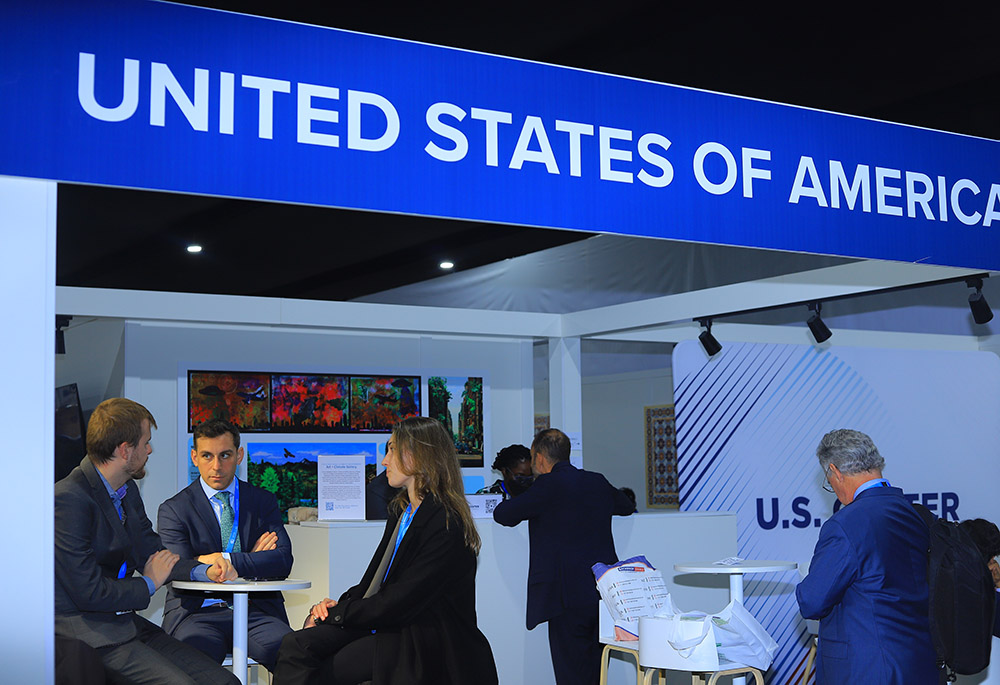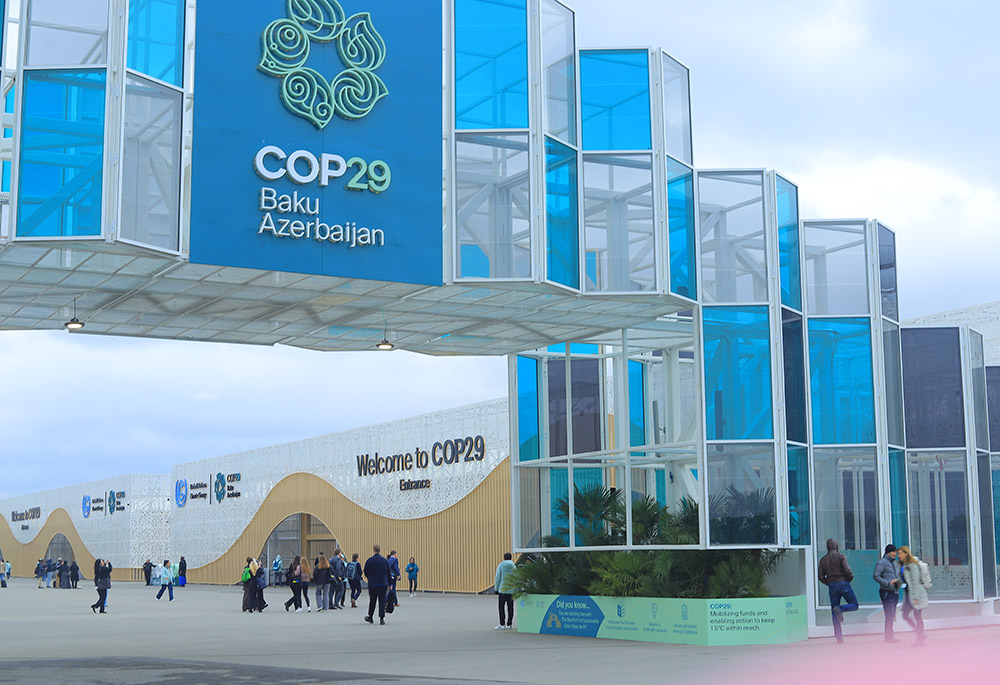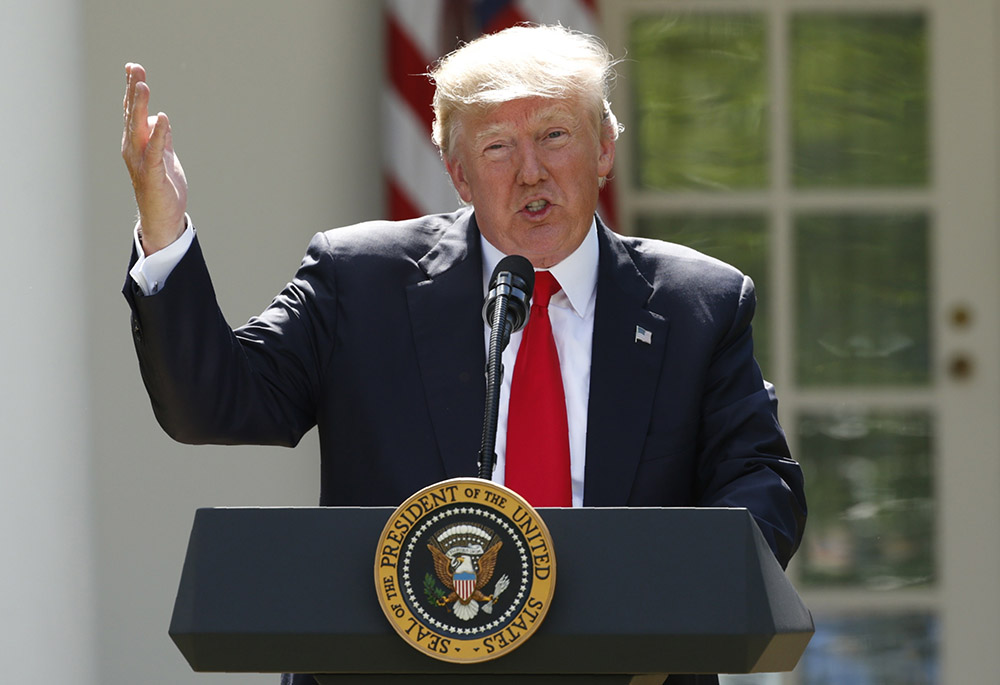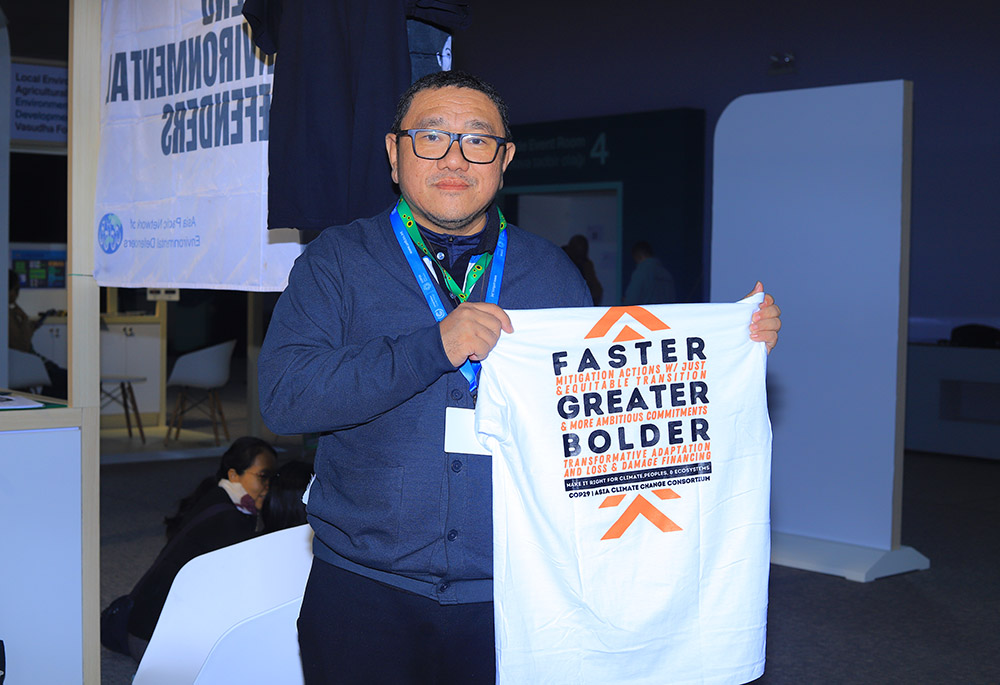
Delegates engage in discussions at the United States of America’s pavilion during COP 29 in Baku, Azerbaijan, Nov. 11-22. (NCR photo/Doreen Ajiambo)
The looming return of Donald Trump to the White House has cast a shadow over the United Nations climate change conference, say Catholic officials here from around the world who worry the U.S. president-elect this time will not only halt the country's progress in slashing heat-trapping emissions but undermine international efforts in the process.
"Many people here feel demoralized," said Rose Omariba, Laudato Si Movement Kenya's chapter leader.
"Some [leaders] didn't even attend, and others may not fully commit to participating in the negotiations or supporting climate finance and efforts to combat climate change due to U.S. influence over other nations."
The U.N. summit, known as COP29, began in Baku, Azerbaijan, less than a week after Trump was elected the 47th U.S. president. He has pledged, as he did in his prior term, to pull the U.S. from the 2015 Paris Agreement on climate change. That deal holds the nearly 200 countries that ratified it to reduce national greenhouse gas emissions to limit average global temperature from rising more than 1.5 degrees Celsius (2.7 degrees Fahrenheit).

The main gate of the United Nations climate change conference (COP 29) in Baku, Azerbaijan, Nov. 11-22. (NCR photo/Doreen Ajiambo)
"The U.S. election outcome is very unfortunate for the world and the planet," said Lydia Lehlogonolo Machaka, energy and extractivism officer with the international Catholic development network CIDSE.
While diplomats and negotiators in Baku are focused on setting a new climate finance target to assist developing countries, updated and strengthened national climate plans are due in February, just a month after Trump returns to power.
Omariba, a climate activist, emphasized that the United States is the world's largest economy and the second largest present-day emitter, making it challenging to negotiate a strong agreement, on finance or other climate-related solutions, without its involvement.
The U.S. accounted for 11% of global greenhouse gas emissions in 2023, and 20% of historical emissions, according to the U.N. Environment Programme's 2024 emissions gap report. In comparison, China led in 2023 emissions (30%) and the European Union produced 6% of global emissions. Africa, which has faced some of the most severe climate impacts, accounted for 6% as a continent.
"There is a lot of fear among delegates, especially faith leaders," Omariba told EarthBeat. "We need to continue making the noise about climate change so that we can have Trump see that the environmental crisis is real, not a myth."

Rose Omariba, Laudato Si Movement Kenya's chapter leader, is pictured during COP 29 in Baku, Azerbaijan, Nov. 11-22. (NCR photo/Doreen Ajiambo)
Trump's win presents 'serious challenge'
When the Paris Agreement was established in December 2015, world leaders designed it partly with the U.S. in mind.
The climate accord was intentionally created not as a new treaty, which in the U.S. requires approval of the Senate, but a deal under an existing one to which the U.S. was already a party — the U.N. Framework Convention on Climate Change.
Negotiators also added a provision that countries could not seek to exit the Paris Agreement until three years after its ratification, followed by a one-year waiting period. That meant that Trump, while announcing in June 2017 he was withdrawing the U.S., the country did not formally leave it until Nov. 4, 2020.

Then-U.S. President Donald Trump announces his decision that the United States will withdraw from the landmark Paris climate agreement June 1, 2017, in the Rose Garden of the White House in Washington. (CNS/Reuters/Kevin Lamarque)
Days later, Joe Biden was elected president and signed an executive order his first day in office to return the U.S. to the Paris accord, which took effect 30 days later. While in the White House, Biden, the second Catholic president, set a new climate goal to cut U.S. emissions between 50% and 52% compared to 2005 levels by 2030. To meet it, he signed into law the Inflation Reduction Act, the largest-ever climate investment package that alone was estimated to curb U.S. emissions by 40% by 2030.
Over the weekend, Biden traveled not to Baku but Brazil, where he became the first sitting president to visit the Amazon rainforest. During his visit to Manaus, Biden announced the U.S. has surpassed its of $11 billion in climate financing by the end of 2024, and would invest more than $120 million in initiatives in Brazil aimed at reforestation, conservation and supporting Indigenous communities. The president also designated the day of his visit, Nov. 17, as International Conservation Day.
"The fight against climate change has been a defining cause of my presidency," Biden said at the Museum of the Amazon.
He continued: "It’s no secret that I’m leaving office in January. I will leave my successor and my country in a strong foundation to build on if they choose to do so. It’s true some may seek to deny or delay the clean energy revolution that’s underway in America, but nobody — nobody — can reverse it. Nobody."
This time, U.S. withdrawal process from the Paris Agreement will only take a year. Trump's transition team has signaled that will begin on his first day. Having called climate change a "hoax," he has also pledged to ramp up oil and gas production and cut clean energy funding and has considered an attempt to exit the U.N. climate convention.
Faith leaders who spoke to EarthBeat said the repercussions of the previous U.S. exit are already significant. Combined with Trump's fossil fuel expansion plans, doing so again, they warned, not only undermines America's leadership role but also risks encouraging other nations to reduce their own commitments under the agreement.
"Trump is the walking definition of imprudence on climate change," said Fletcher Harper, an Episcopal priest and executive director of GreenFaith. "He has openly promised the fossil fuel industry that he'll do their bidding. He derides the seriousness of the issue. He's reinforced the worst demons of human nature on this issue, and he's a grave threat."
Damian Spruce, advocacy associate director at Caritas Australia, said for now the U.S. remains a significant participant in the ongoing climate change commitments and negotiations, especially with the Biden administration actively involved in this COP.
"Until there is a change in administration, the U.S. will continue to play an important role," he said.

Damian Spruce, advocacy associate director at Caritas Australia, is pictured during COP29 in Baku, Azerbaijan, on Nov. 11-22. (NCR photo/Doreen Ajiambo)
Spruce told EarthBeat he is confident that world leaders in Baku have the opportunity to unite around a new financial goal for developing countries, one that could profoundly impact the energy transition for years to come. Countries are expected to reach a new funding target for the first time in 15 years to support developing countries in climate mitigation, adaptation and recovery from climate-related losses and damage. The old goal — $100 billion annually by 2020 — was reportedly achieved in 2022, though some environmental organizations have questioned how the financing is tallied.
In addition, countries at COP29 are expected to signal their ambition for the next round of national climate plans, to enhance adaptation strategies and to prepare the loss and damage fund to begin distribution.
"We must continue to use diplomatic methods with the U.S. to achieve the best possible outcomes as we move forward," Spruce said, highlighting the country's significant influence over other nations.
Still, he conceded "Trump's recent victory in the U.S. election is already shaping the tone at the UN COP29 climate talks, presenting a serious challenge in our fight against the climate crisis."
Advertisement
The U.S. delegation at COP29, led by John Podesta, senior adviser to the president for international climate policy, has sought to reassure the global community that U.S. efforts on climate change will continue in some fashion regardless of the direction set by the incoming Trump administration.
Speaking with reporters as COP29 began, Podesta, who is Catholic, addressed the election results, saying, "It’s clear that the next Administration will try to take a U turn" and reverse much of the climate progress achieved under Biden.
"This is not the end of our fight for a cleaner, safer planet," Podesta said.
A day later at the world leaders' summit, Podesta called for all major economies need to align their next climate pledges with the 1.5 C goal.
Following Trump's reelection, Spruce stated, "It is crucial for the rest of the world to unite and take meaningful climate action. We must commit to climate finance and ensure proper access to resources for the Global South and vulnerable countries. This is essential for addressing climate change, adapting to its impacts, and reducing carbon emissions."
Officials urge action, with or without US
Catholic officials and other people of faith are urging other world leaders to remain steadfast in their fight against climate change, especially if the U.S. ultimately leaves the Paris Agreement.
"Global leaders and key stakeholders, including faith leaders, must unite to drive urgent climate action forward, regardless of U.S. involvement," Omariba said.
Rodne Rodiño Galicha, executive director of Living Laudato Si' Philippines, highlighted that the extreme storms intensified by climate change have devastated communities worldwide in 2024, impacting nations such as Brazil and the Philippines. He also mentioned that the average annual global temperature could reach 1.5 °C above pre-industrial levels for the first time this year.
"This reality calls for immediate action and collective responsibility to combat climate change and protect our planet," he stated, emphasizing that the resolution cannot rest solely on the U.S. "While the United States has significant influence, we must allow the voices of 6 billion people from the Global South to take center stage in the fight for climate action."

Rodne Rodiño Galicha, the executive director of Living Laudato Si' Philippines, holds a printed t-shirt with a climate change message on the background at COP 29 in Baku, Azerbaijan, on Nov. 11-22. (NCR photo/Doreen Ajiambo)
Brazil, which will host COP30 in the Amazon city of Belém, submitted its new climate pledge ahead of the Baku gathering, committing to reduce its emissions by 59% to 67% below 2005 levels by 2035, and reach net-zero emissions by 2050.
The pledge, submitted under the government of Luiz Inacio Lula da Silva, is in sharp contrast to his predecessor Jair Bolsonaro, who like Trump denied climate change and sought to ramp up fossil fuel production.
While climate progress advances in Brazil, Argentina has signaled it may join the U.S. in disengaging from the U.N. climate talks. Its far-right leader Javier Milei ordered the country's negotiators in Baku to return home after just three days, the Guardian reported. He too has called climate change a "socialist lie" and at one point floated the possibility of withdrawing from the Paris Agreement.
Galicha encouraged Catholics and other Christians around the world to rise and fight for climate change to save the Earth, even if wealthy countries like the U.S. show little interest in addressing climate change and increasing their financial commitment.
"Let us not fail the church, let us not fail Pope Francis," he said.
"This is not just about being Catholic; it is about being real Christians who embody the virtues of love, compassion, and care for creation. While we believe in life after death, we also have the responsibility to protect life before death and care for those who are alive."






